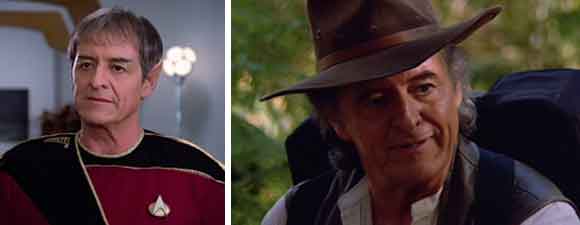Retro Review: Thine Own Self
7 min readData loses his memory and inadvertently exposes a technologically unsophisticated culture to deadly radiation.
Plot Summary: Troi returns from a reunion and talks to Crusher – who is in command of the night shift – about the latter’s reasons for seeking to become a bridge officer. Crusher explains that she enjoys being in charge and gives the order to ferry medical supplies to a nearby colony, leaving Data on Barkon IV to complete a mission to retrieve nuclear debris from a crashed Starfleet probe before it can affect the pre-industrial civilizations on that planet. Data cannot receive hails from the ship because of the radiation, so Crusher has no way of knowing that Data has lost his memory of who he is and why he is carrying a case marked “radioactive.” When a disheveled Data enters a local village, he meets a man named Garvin and his daughter, Gia, who learn that he is from the mountains beyond the village. Many in their village are superstitious, but the medic Talur examines Data and determines that his odd coloring signify neither illness nor monstrosity, but the fact that he is an “iceman” from the mountains. Later, while the blacksmith Skoran is negotiating to buy some of Data’s radioactive metal to make jewelry, the villagers witness Data’s great strength when he lifts a heavy anvil off a man’s leg. Talur guesses that all icemen must be strong to fight off the wild creatures that live in the mountains. When he watches her teach a class about the four elements, Data claims that Talur’s scientific methods are flawed, but though she resents this intrusion, she tries to understand his own approach to science. Soon afterward, several villagers become ill. Skoran believes Data has brought illness to the village, but Data surmises that the metal he brought into the village is the real culprit. He is able to show Talur that the metal gives off energy, and he develops an antidote to the radiation sickness, but Skoran and other fearful villagers attack Data as he puts the antidote into their drinking water, exposing his android circuits and deactivating him. Meanwhile, Troi prepares for the Bridge Officer’s Test but she repeatedly fails the engineering portion, destroying the Enterprise in simulations. Riker tells her that he cannot allow her to continue, since his first duty is to the ship. Taking those words to heart, Troi starts the test simulation on the holodeck and orders LaForge to repair an antimatter leak, knowing that the radiation exposure will kill him. Riker interrupts the simulation and congratulates her on passing the test, confirming that the real test was to see whether Troi could order a fellow officer to his death in order to save the ship. Later, Riker and Crusher beam down to Barkon IV disguised as natives and learn from Gia that Data has been “killed” by the villagers, though they buried the dangerous metal in the woods. The Enterprise beams up both the fragments and Data, who remembers nothing of his time in the village when he is reactivated.
Analysis: I had remembered “Thine Own Self” as a mediocre merger of “Pen Pals” and “Who Watches the Watchers” – neither of which is flawless in the first place – yet although it feels derivative and is rather predictable, it plays better than its summary suggests, largely because of effective casting and a good balance between the largely unrelated A and B plots. This is my favorite Troi story of the season, though she’s rather more temperamental than usual, and it’s been a long time coming since we first saw her in command in “Disaster” – she spends a lot of her time working on the bridge, it makes sense that she’d want to take the Bridge Officer’s Test even if she wasn’t feeling competitive with former classmates after a reunion, and in some ways she seems a more obvious choice than Crusher, who has already qualified yet who spends far more of her time in Sickbay. The initial scenes between Troi and Riker are lovely – Troi finds her onetime Imzadi playing the trombone and tells him he communicates better that way than speaking, then explains her reasons for wanting to become a full Commander, which he accepts though he warns her that he’s going to be just as tough on her as he’d be on anyone else in her position. I wish we got to see some other aspect of her test-taking than the areas with which she has the most trouble, since we don’t need Riker to tell us that she’d pass the aspects dealing with negotiation and leadership with high marks. He isn’t overly concerned when she stumbles over technobabble – Picard often needs LaForge and Data to provide his engineering solutions, and “Congratulations, you just destroyed the Enterprise” may be my favorite line of the season – but he’s right to guess that it may not even occur to her to sacrifice a friend in the name of duty to the ship, and perhaps Troi’s growing anger is because she, too, knows deep down that there are requirements to the job she really doesn’t want to think about. We already know that Crusher can risk lives for Starfleet, even though Crusher is a doctor, considering that the first thing we see her do in this episode is to leave Data behind even though the ship can’t confirm that his mission is going as planned.
As much as I enjoy watching Troi become a Commander, I wonder whether “Thine Own Self” would have been a stronger episode had it spent the full time focusing on Data among the aliens, and letting us see him more from their perspective than from Data’s own. Despite Data’s amnesia and willingness to sell radioactive metal to a trader who will spread it all over the village, we never see him as truly scary or dangerous in comparison to the villagers who come after him with axes, yet we should. He may be correct that even the most enlightened among them is uneducated and limited in her perspective, but he and the metal he carries pose a far greater threat to the people of Barkon IV than whatever narrow-minded prejudices exist among these villagers. No, he isn’t poisoning their well as they fear, but yes, he is the cause of their suffering, and it makes me uncomfortable to see the rushed attempt to draw parallels between this TV fiction and the way Jews and Gypsies were historically treated in parts of plague-infested Europe, where they were completely innocent of bringing any illness into the villages. The way it’s filmed, we’re supposed to see Data as the innocent victim of a medieval mob, but there’s a wider question of complicity within the story: Why did Starfleet allow a dangerous probe to come so close to a pre-warp society? With whom does responsibility ultimately rest for abandoning Data to the mission to ferry the medical supplies? Considering that a few weeks ago, Picard was willing to let an entire civilization become extinct rather than risk exposing them to modern technology, it’s particularly heinous that there are no Federation cultural experts stationed in the mountains to keep an eye on Data’s progress, and that no one even tries to follow up on Data’s contact with the villagers, who because of his contact now have a rudimentary understanding of chemistry and radioactivity. Are we sure Skoran isn’t going to come after Talur with a pitchfork if she decides to study antidotes and suggests changes to how they have traditionally treated disease?
Though the art direction is quite good in “Thine Own Self,” I’m always a bit frustrated with how Star Trek portrays pre-warp societies, and Barkon IV is no exception, particularly since we get little sense of the social structure or beliefs of the culture. Data is constantly challenging people – why teach children that fire is an innate part of wood just because wood is combustible? why does everyone assume there are wild monsters in the mountains when no one has ever seen one? – but we receive no answers. From Talur’s position, it seems that women have more rights than their human medieval counterparts did, but we get no sense of whether there’s an inherited aristocracy or whether this is a particularly prosperous time for the village as a whole (with only a single well and all other fresh water two days’ away, a minor drought would seem to be a devastating threat). Data is open to Gia’s vague religious hope that her dead mother is in some sort of heaven, yet it’s implied that Data may have a residual memory of the future represented by the Enterprise rather than a belief in an afterlife. Is Skoran so fearful and violent because of specific events – did he lose a lover, or a child, as Garvin did – or are we just supposed to assume there will always be distrustful, angry people, at least until the magical future of Star Trek puts a lid on that? There’s never enough time for real world-building in a single episode, especially one like this where the focus is split between the planet and the ship, which makes for more dynamic television in some ways but also leads to shortcuts that ultimately make the story less believable or enjoyable. Then, too, there’s the fact that Data’s “amnesia” doesn’t make a lot of sense, leaving him able to remember enough science to cure radiation sickness with stone knives and bearskins yet unable to recall that there are starships or probes or androids. The image of him impaled by a metal pole is memorable, as is his sweet relationship with Gia, who will surely be scarred for life by losing a friend in this manner, though Riker and Crusher seem quite unconcerned about her feelings. As a character episode, things hold together well enough, but I’m having to force myself not to overthink rather than admiring its thoughtfulness.






